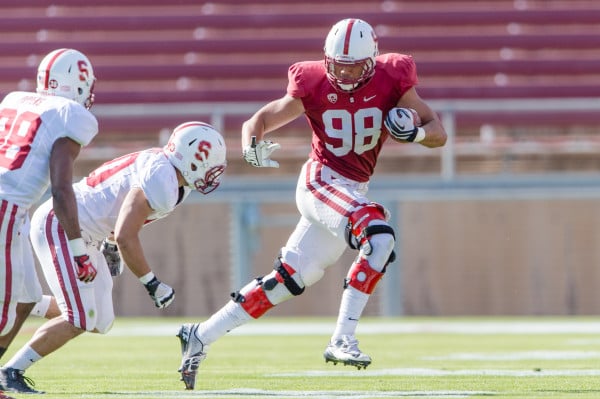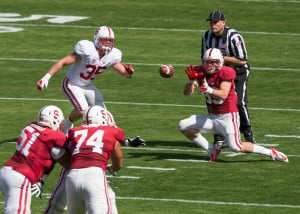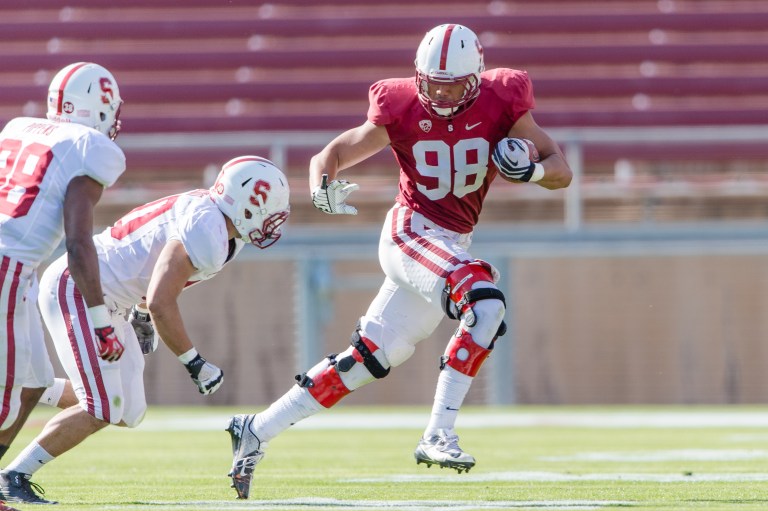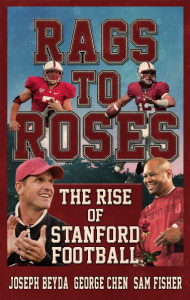
It’s been a sluggish evening for the Stanford offense. The Cardinal has turned the ball over three times, and even though it has gained more than 400 yards, it only has a single touchdown to show for its efforts. Nothing is coming easy — it never does, here at Autzen Stadium.
But after a 10-play, 68-yard drive, Stanford is finally knocking on the doorstep, facing a first-and-goal at the Oregon 10-yard line. Trailing by seven, redshirt freshman quarterback Kevin Hogan takes the snap and fires quickly to the back left corner of the end zone, where his star tight end, senior Zach Ertz, is fighting for position with Ducks corner Ifo Ekpre-Olomu.
Ertz snags the ball by his fingertips, but in this defensive slugfest, his job is not done. Ekpre-Olomu knocks it free and Ertz, landing on top of the defensive back, watches the potential game-winning pass fall toward the turf.
He reaches his arms out and, by some stroke of luck, manages to corral the football once more. He pins it against his body, twists backward over Ekpre-Olomu and hits the ground with his right shoulder, which is barely in bounds.
Ertz’s effort would send the game into overtime and help propel Stanford to its first Rose Bowl since 2000. There was an air of finality to his miraculous — and controversial — catch: After three years, Stanford’s Oregon problem had finally been solved.
But nine months after Ertz’s heroic bobble in the corner of that Autzen Stadium endzone, Stanford’s juggling at the tight end position is far from over.
With Ertz and classmate Levine Toilolo gone to the NFL, the Cardinal doesn’t have a single tight end on its roster who has caught a collegiate pass. Stanford’s coaching staff may love using its tight ends in the passing game, but it’s not going to put its offensive philosophy ahead of securing a win; if “Tight End U” wants to live up to its name this season, it’s going to need significant contributions from some not-so-familiar faces.
“They’ve got a chance to be [as big a part of the offense as in the past],” said new tight ends coach Morgan Turner. “It depends who steps up tight end-wise, receiver-wise, running back-wise.”
Stanford hasn’t lost its top two tight ends since 2005, when Matt Traverso and Michael Horgan graduated. But that pair combined for just 29 catches their final year; in 2012, Ertz and Toilolo had 93. Ertz alone had 69 receptions, making him the first tight end to lead Stanford in that category in nearly a decade.
One Cardinal player saw opportunity in his team’s predicament, however. Not too long after watching Ertz and Toilolo run their last collegiate routes in the Rose Bowl, rising junior defensive end Charlie Hopkins approached head coach David Shaw. Hopkins had started the year as a second-stringer, but by season’s end, he had fallen behind talented true freshman Aziz Shittu on the depth chart. Hopkins had yet to see the field after two years on the Farm, and with all four of the team’s top defensive ends returning, the wait would only get longer for the former four-star recruit.
So Hopkins asked his coach if he could switch to tight end, a position he had played for less than a year in high school. Shaw agreed, but one thing was off the table from the very beginning: Hopkins’ job wasn’t to replace Ertz or Toilolo.
“If I can fill just half of their production,” Hopkins said, “…whatever I can do to help the team, that’s what I’m aiming for.”

The move made sense on the depth chart, but it wouldn’t come without its challenges. For years, Hopkins had been tasked with bulking up; he weighed 240 pounds as a junior in high school, 270 coming into Stanford and 274 at the beginning of his sophomore season. This offseason, he lost 20 pounds.
“He looks like a tight end now,” Turner said.
Hopkins would also need to pick up the intricacies of the position — the subtle details that had made Ertz and Toilolo so dominant. But since it was too late to get that information straight from the horse’s mouth, Hopkins turned to the next best thing: senior tight end Davis Dudchock.
Dudchock was no stranger to a long wait on the depth chart himself, having spent three years behind Konrad Reuland, Coby Fleener, Ertz and Toilolo, all of whom now play in the NFL.
“Some of those things that I learned from Zach, Coby and Levine over the years, [Hopkins] is seeing those [now],” Dudchock said.
Dudchock may be helping Hopkins in his development, but those two players are actually competing for the same starting job as Stanford’s “F” tight end, which specializes in catching passes downfield.
The “Y” tight end spot, saved for an excellent blocker that runs primarily underneath routes, has already been claimed by Luke Kaumatule. The 6-foot-7, 267-pound sophomore’s physicality is impressive; he is just one inch shorter than Toilolo, and Kaumatule actually weighs two pounds more than his predecessor did at this point last year. All that’s left for the first-time starter is a mastery of the Cardinal’s extensive playbook.
“He’s got great tenacity. He’s got a lot of talent, and his work ethic is one of the best on the team,” Dudchock says. “We have a sign on our field that says, ‘You’re getting better or you’re getting worse; you never stay the same.’ Luke’s getting better every day, and that’s what we need from him.”
Kaumatule is not the only one with a lot to learn. Stanford’s 12-man recruiting class consisted of three tight ends — Austin Hooper, Greg Taboada and Eric Cotton — who will have even more to take in than their sophomore counterpart.
“Right now, their heads are spinning,” Turner said. “They’re trying to soak it all in, learn it all, learn two different positions.”
It’s anyone’s guess whether or not those true freshmen will make it to the playing field in 2013. All three have their strengths; Hooper is one of the Cardinal’s bulkiest tight ends already, at 254 pounds, while Shaw praised Cotton as the best route-runner playing high school football last year. On the other hand, their sharp learning curve will put them at a significant disadvantage when it comes to competing against veterans like Dudchock, Hopkins and senior Eddie Plantaric.
History isn’t on the newcomers’ side either — Fleener, Ertz and Toilolo all redshirted as true freshmen. Yet if there’s ever a time for a true freshman tight end to have a breakout rookie season, it’s 2013, when the entire position group is tasked with overcoming the same experience gap.
“Right now, [our goal is] just get as many reps as possible for them to learn,” Turner said of his tight ends, young and old. “Most of the guys, they’ve been here learning from great players. And they soak that in. They see what they do. They see the work ethic…they’re able to make huge strides once they actually get the reps.”
Chances are that no one Cardinal tight end will be Hogan’s primary target in crunch-time situations this year — at least not in the way that Zach Ertz was in 2012. But if enough knowledge can trickle down from the last generation of great pass-catchers to come through the Farm, Stanford’s coaching staff should have a promising group of tight ends to work with.
“We have multiple tight end spots,” Dudchock says confidently, “and our coaches are going to put us in great positions to utilize those spots and mismatches.”
Some things never change.
Contact Joseph Beyda at jbeyda “at” stanford.edu.
The Daily’s football preview series will be back next week, as we take a look at Stanford’s linebackers.
Previous installments in our 2013 football season preview:
Aug. 14: Hogan embraces leadership role, ready to take the next step
Aug. 13: Offensive line powers forward, seeks new center
Need your Stanford football fix for the weekend? Check out “Rags to Roses,” available in the Amazon Kindle store now! Stanford Daily football beat writers Joseph Beyda, George Chen and Sam Fisher interviewed 30 current and former players and coaches to bring you the story of the Cardinal’s resurgence from 2006 to 2012. You can also check out the free excerpts here.

